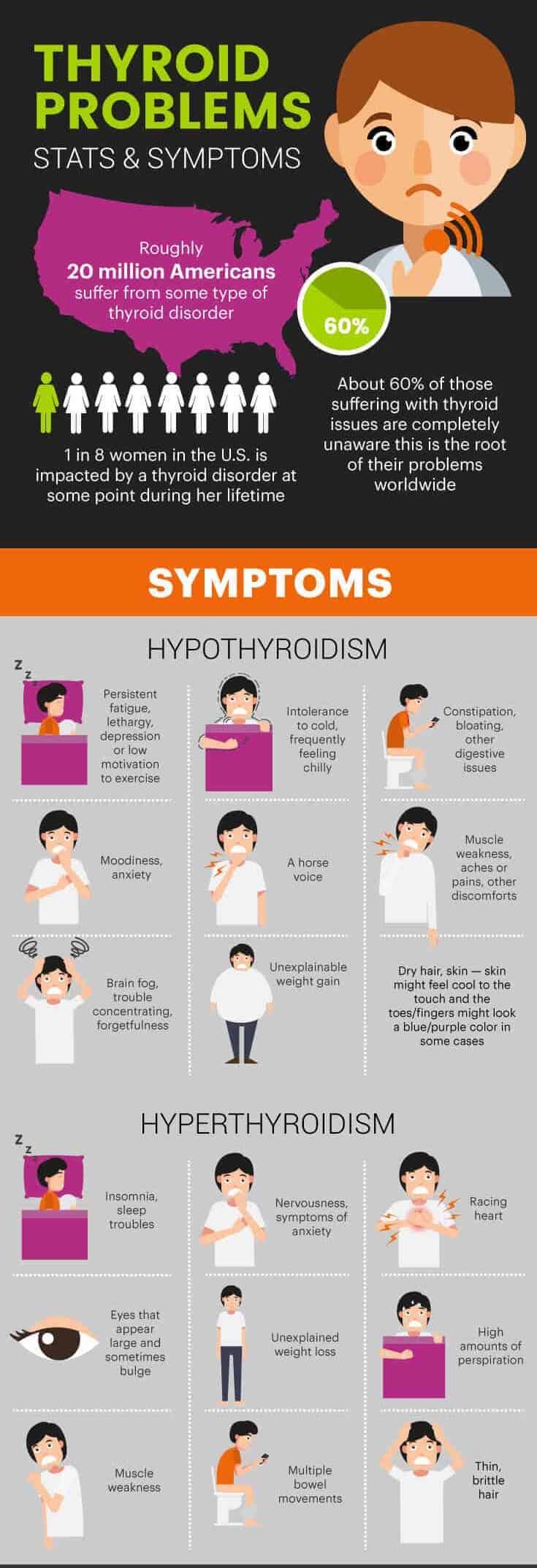Are you struggling to lose weight despite eating well and exercising regularly? It’s frustrating when the scale won’t budge, and you start wondering if something else is holding you back.
One common but often overlooked reason could be your thyroid. Your thyroid plays a powerful role in controlling your metabolism, and if it’s not working properly, it can make losing weight much harder. You’ll discover how thyroid problems might be affecting your weight loss efforts and what you can do about it.
Keep reading—your journey to understanding and managing your weight just got a lot clearer.

Thyroid And Metabolism
The thyroid gland is a small organ in the neck. It controls many body functions by making hormones.
These hormones affect how fast the body uses energy. This process is called metabolism.
Role Of Thyroid Hormones
Thyroid hormones help control how the body uses energy. They affect the heart, muscles, and brain.
Too little thyroid hormone slows the body down. Too much makes the body work too fast.
- Thyroxine (T4) is the main hormone made by the thyroid.
- Triiodothyronine (T3) is the active form that affects cells.
- These hormones regulate energy use and heat production.
How Metabolism Influences Weight
Metabolism is how the body turns food into energy. It controls calorie use and fat storage.
If metabolism is slow, the body burns fewer calories. This can cause weight gain.
- High metabolism helps burn more calories.
- Low metabolism causes the body to store more fat.
- Thyroid problems can change metabolism speed.

Common Thyroid Disorders
The thyroid is a small gland in the neck. It controls how your body uses energy.
Thyroid problems can change your weight and how you feel. Two common issues are hypothyroidism and hyperthyroidism.
Hypothyroidism And Weight Gain
Hypothyroidism happens when the thyroid does not make enough hormones. This slows down your body’s energy use.
People with hypothyroidism often gain weight. This weight gain is due to a slower metabolism and water retention.
- Low energy levels
- Slow metabolism
- Increased fat storage
- Water retention
Hyperthyroidism And Weight Loss
Hyperthyroidism means the thyroid makes too many hormones. This speeds up your body’s metabolism.
People with hyperthyroidism often lose weight even if they eat normally. The body burns calories too fast.
- Increased metabolism
- Faster heart rate
- More energy use
- Unintended weight loss
Impact On Weight Loss Efforts
Thyroid problems can change how your body uses energy. This can make weight loss harder.
Understanding how thyroid issues affect weight helps you set realistic goals. It also guides your diet and exercise plans.
Challenges In Losing Weight With Thyroid Issues
Thyroid problems slow down metabolism. This means your body burns fewer calories than normal.
Symptoms like fatigue and muscle weakness make exercise difficult. This reduces the chances of burning calories.
- Lower metabolism slows calorie burn
- Fatigue reduces physical activity
- Hormone imbalance causes water retention
- Changes in appetite can lead to overeating
Effect Of Thyroid Medication
Thyroid medication helps restore normal hormone levels. This can improve metabolism and energy levels.
Proper medication makes it easier to lose weight. But it may take weeks before you see results.
- Medication balances hormone levels
- Energy levels increase with treatment
- Metabolism returns to normal
- Weight loss becomes more achievable

Diet And Exercise Tips
Thyroid problems can change how your body uses energy. This can make losing weight harder.
Eating right and moving your body can help you manage weight with thyroid issues.
Nutrition For Thyroid Health
Your thyroid needs certain nutrients to work well. Good nutrition supports hormone balance.
Eat foods rich in iodine, selenium, and zinc. These help the thyroid make hormones.
- Include seaweed, dairy, and eggs for iodine
- Eat Brazil nuts and sunflower seeds for selenium
- Try meat, shellfish, and legumes for zinc
- Limit soy and cruciferous vegetables if eaten raw
- Drink enough water and avoid too much sugar
Effective Workouts For Thyroid Conditions
Exercise boosts metabolism and helps burn calories. It also improves mood and energy.
Choose workouts that fit your energy level. Balance cardio, strength, and flexibility exercises.
- Try walking, cycling, or swimming for cardio
- Use light weights or resistance bands for strength
- Stretch daily to keep muscles flexible
- Practice yoga or tai chi to reduce stress
- Rest well and avoid over-exercising
When To Seek Medical Help
Thyroid problems can make it hard to lose weight. If you notice unusual changes in your body, it is important to see a doctor. Early help can improve your health.
Some signs show that your thyroid might not work well. Knowing these signs helps you get the right care on time.
Recognizing Symptoms
Thyroid issues can cause many symptoms. You might feel tired or cold often. Your weight may change without a clear reason. Your skin can become dry and your hair may thin.
- Feeling very tired or weak
- Sudden weight gain or loss
- Cold hands and feet
- Dry skin or thinning hair
- Changes in mood or memory
- Swelling in the neck area
If you see one or more of these signs for weeks, talk to a doctor. They can check if the thyroid is the cause.
Tests And Diagnosis
Doctors use blood tests to check thyroid health. These tests measure hormone levels. Low or high levels can mean a problem.
Other tests may include imaging to look at the thyroid gland. The doctor will decide which tests you need based on your symptoms.
- Thyroid-stimulating hormone (TSH) test
- Free T4 and Free T3 hormone tests
- Thyroid antibody tests
- Ultrasound of the thyroid gland
Managing Weight With Thyroid Problems
Thyroid problems can make it hard to lose weight. The thyroid controls how your body uses energy.
Understanding how to manage your weight with thyroid issues can help you stay healthy. Small changes can make a big difference.
Lifestyle Adjustments
Eating a balanced diet supports your thyroid and weight goals. Focus on whole foods with plenty of nutrients.
Regular exercise helps boost metabolism and burn calories. Choose activities you enjoy to stay consistent.
- Eat fruits, vegetables, and lean proteins
- Limit processed and sugary foods
- Exercise at least 30 minutes most days
- Get enough sleep each night
- Manage stress with relaxation techniques
Long-term Strategies
Work with your doctor to monitor thyroid function regularly. Medication may be needed to balance hormone levels.
Set realistic weight goals and track progress over time. Patience is key as thyroid-related weight loss can be slow.
- Take thyroid medication as prescribed
- Have blood tests to check hormone levels
- Adjust diet and exercise based on health needs
- Stay informed about thyroid health
- Seek support from health professionals
Frequently Asked Questions
Can Hypothyroidism Cause Weight Gain And Difficulty Losing Weight?
Yes, hypothyroidism slows metabolism, causing weight gain and making weight loss harder. Proper treatment can improve metabolism and support weight loss efforts.
How Does Hyperthyroidism Affect Weight Loss?
Hyperthyroidism often causes weight loss due to increased metabolism. However, it can also lead to muscle loss and nutritional deficiencies if untreated.
Can Thyroid Medication Help With Weight Loss?
Thyroid medication normalizes hormone levels, improving metabolism. It can aid weight loss but should be combined with diet and exercise for best results.
Is Weight Gain Always Related To Thyroid Problems?
Not always. Weight gain can result from various factors like diet, lifestyle, or other medical conditions, not just thyroid issues.
Conclusion
Thyroid issues can impact weight loss efforts. Hormone imbalances slow metabolism. This makes shedding pounds difficult. Treatment and lifestyle changes help manage symptoms. Regular exercise and a balanced diet support weight goals. Consult your doctor for advice tailored to your needs.
Medication can regulate hormone levels effectively. Patience is key on this journey. Small changes lead to big results over time. Understanding your body helps in setting realistic goals. Stay informed, stay motivated, and remember progress takes time. You’re not alone in this struggle.
Many face similar challenges and find solutions. Stay committed, and success will follow.



